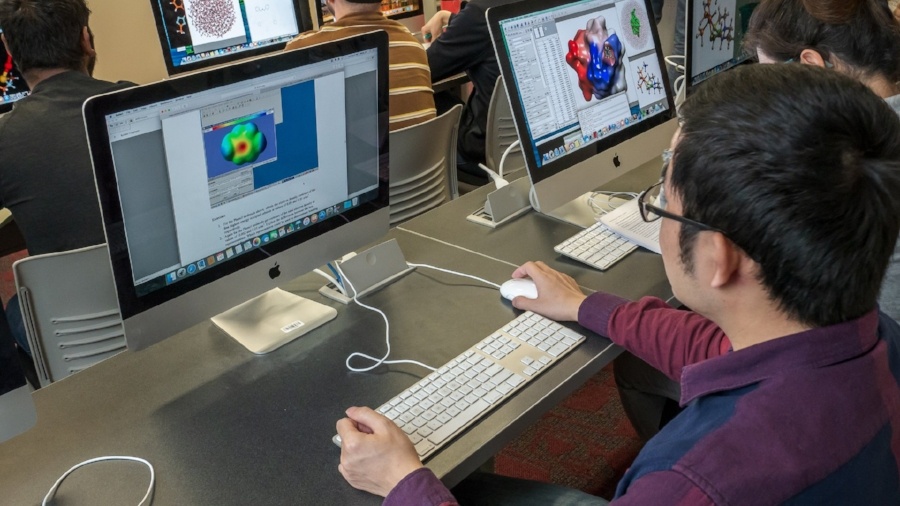
Chemistry, the science that studies all matter, has its roots in antiquity — but rapid advances in technology in the 20th century have created entirely new ways of exploring physical reality. Massive increases in computing power have enabled classical or theoretical chemists to explore the world of quantum mechanics and to develop advanced ways of modeling molecular structure and interaction.
The 20th century gave rise to theoretical and computational chemistry, now one of the fastest growing fields of chemical study. None of this growth and discovery would have been possible without the work of visionary chemists who saw that the future of chemistry had to include both traditional laboratory exploration and new virtual exploration through the power of high-performance computers and advanced computer modeling.
In this blog post, we want to introduce you to some of the major figures who have done or are doing cutting-edge research in the field of theoretical and computational chemistry and contributed to PhD in Chemistry programs around the world.
John Pople and Walter Kohn
The field of computational chemistry was not widely considered a distinct field of study until Pople and Kohn won the Nobel Prize in Chemistry in 1998 for their work on computational models in quantum chemistry and density-functional theory respectively.
This award was the summation of many decades worth of work by both Kohn and Pople starting in the 1960s. In 1964, Kohn demonstrated that the total energy for a chemical system described by quantum mechanics could be determined based on the spatial distribution of electrons (electron density) in the system. This initial insight was followed by years of work done by Kohn and others to expand the accuracy of these equations to describe large-scale studies of molecular systems. Kohn’s work became known as the density-functional theory and it has had profound implications for mapping chemical reactions and examining the geometrical properties of molecules.
Meanwhile, Pople was focusing his efforts on building a computer program that would allow theoretical and quantum chemists to gauge the accuracy of their predictions about the behavior of molecules by simulating and then iterating interactions. One of the first scientists to embrace the power of computers to solve complex chemical problems, Pople designed a program called Gaussian70 in the late 1960s which enabled chemists to run quantum mechanical calculations for complex systems like molecules. He continued to improve this program throughout the next several decades, and by the 1990s, was able to incorporate Kohn’s density-functional theory into the computer simulations for molecular modelling.
Michael Levitt, Martin Karplus, Arieh Warshel
In 2013, the Nobel Prize in Chemistry was again awarded to a trio of scientists who focused their efforts on computational chemistry. Levitt, Karplus, and Warshel were given this prize “for the development of multiscale models for complex chemical systems.”
This group of scientists working in the 1970s and onward used Pople’s work on the modeling of quantum mechanical reactions. However, their distinctive contribution to the field of Chemistry is that they were able to develop models that incorporated both classical, Newtonian physics with the radically new insights from quantum physics and to do so in a chemically relevant way. The integration of these two allowed chemists to simulate chemical reactions at the quantum level while also allowing the power of classical physics to describe the impact over systems at a much larger scale.
In their press release at the time of announcement for this prize, the Royal Swedish Academy of Sciences described the computer as “your Virgil in the world of atoms.” They declared that “today the computer is just as important a tool for chemists as the test tube. Simulations are so realistic that they predict the outcome of traditional experiments.” This statement and award are a powerful testimony to the rapid growth and importance in the field of theoretical and computational chemistry.
Dieter Cremer
Pople’s legacy continued in the lives of many students, but particularly in the life and work of Dieter Cremer, a highly distinguished researcher in the field of theoretical and computational chemistry. Cremer completed his postdoctoral fellowship at Carnegie Mellon under the direction of Pople. While at the University of Cologne, he was a founding member of the original CATCO Group, a union of theoretical and computational chemists who designed and used the quantum chemical program package, COLOGNE, as a major tool in their work.
His research ranged from the development of state-of-the-art relativistic methods and computer programs, and their application to chemical problems. His recent work focused on computer design of new catalysts, the description of H-bonds in proteins, as well as chelating organic molecules that can precipitate toxic metals such as lead, cadmium and mercury from industrial wastewater.
In 2009, Cremer moved the CATCO Group to Southern Methodist University and later helped found the world’s first rigorous and comprehensive Theoretical and Computational Chemistry Ph.D. program.
Today at SMU
Today, the legacy of Pople and Cremer’s excellence lives on at SMU in the CATCO Group and in our Theoretical and Computational Chemistry Ph.D. program. Under the leadership of Dr. Elfi Kraka and with the power of SMU’s cluster of supercomputers, cutting-edge research is being done in the fields of drug design, development of environmentally friendly materials, and much more.
Study of the physical world is not a new phenomenon. But in the world of chemistry, the advent of computing power has transformed the realm of what is possible to experiment with and explore. These brilliant scientists are the first of many minds that will unlock mysteries through the study of theoretical and computational chemistry.
Are you interested in using computer models to tackle big chemical research questions? Check out our comprehensive resource below.
